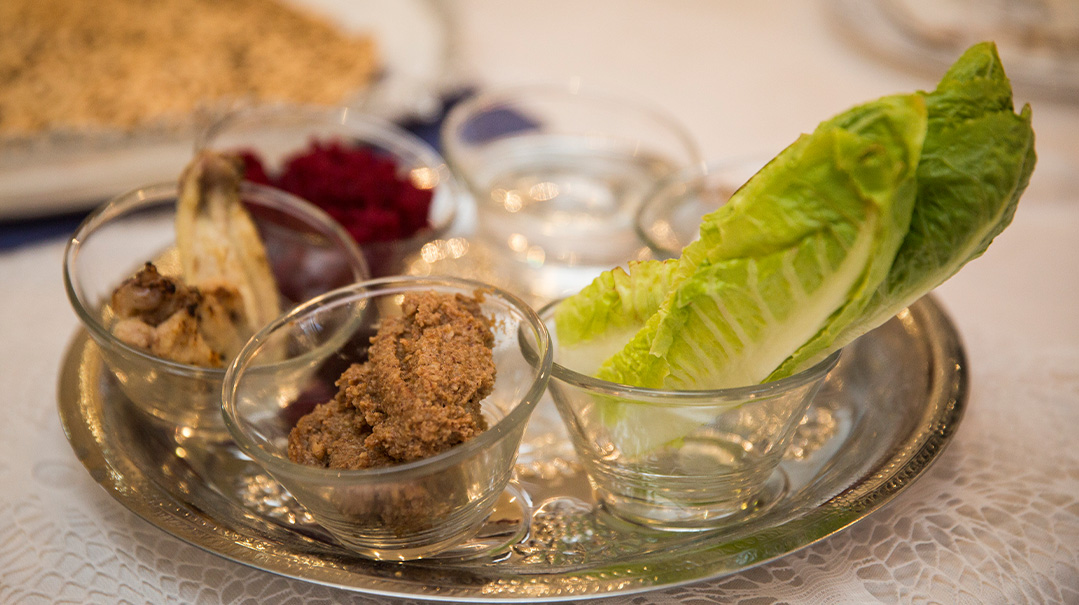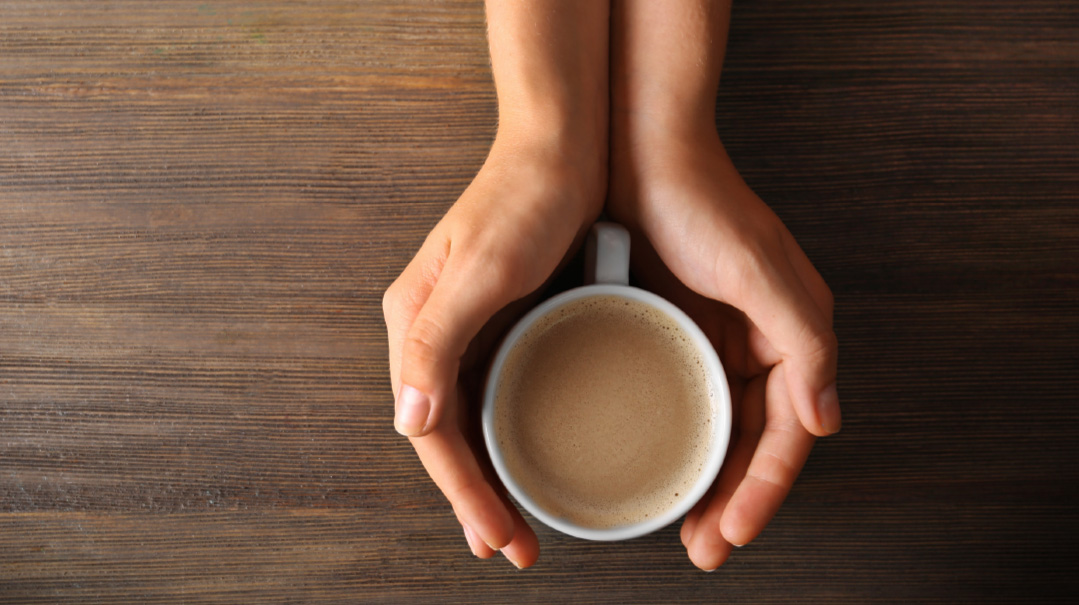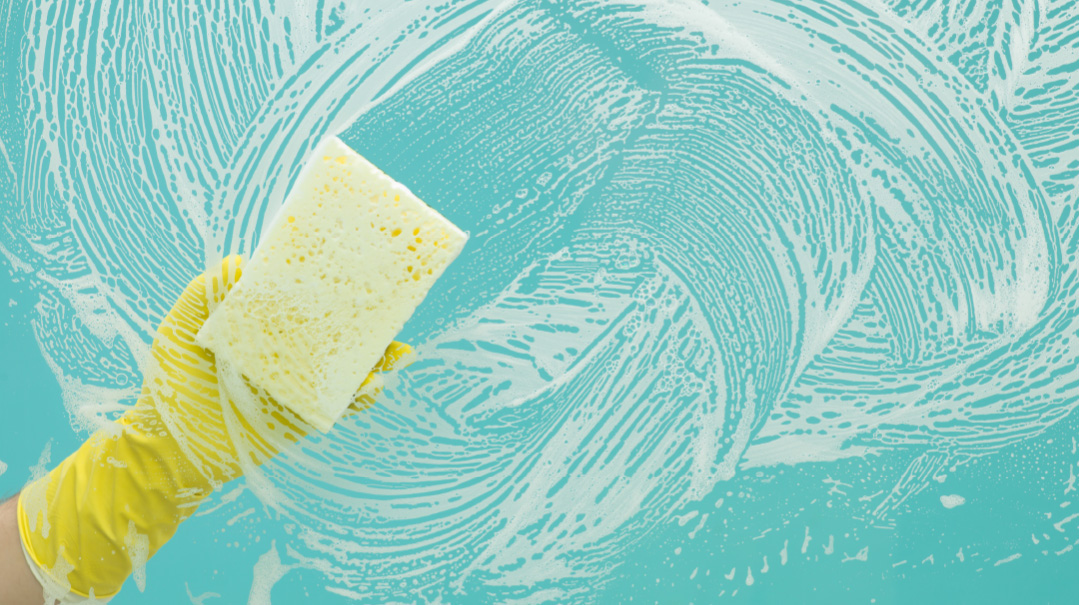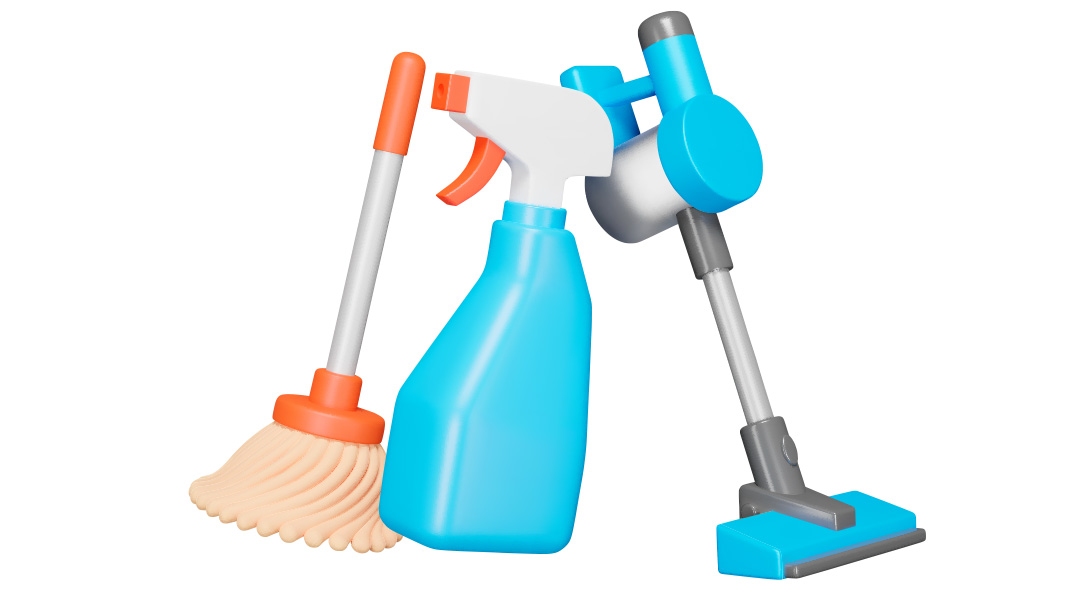Under the Surface
| April 21, 2021When I was diagnosed, it was fine. But this time, it’s my daughter

It was a long night. The darkness stretched like an endless, unspooling black ribbon. But I didn’t cry because I wasn’t grieving. Also, the tears were hiding somewhere inside, and I didn’t know how to find them. I had this sensation that I was teetering at the edge of a jagged cliff, and I held on tightly to the edge of my bed all night. I would not fall.
In my mind’s eye, I saw a memory of another night many years ago, when I teetered at the edge of a very different kind of cliff. I was in my teens then, and I knew that if I could just make it through without falling, I would be all right.
The memory of that far-off night merged with the chasm I was in now like clasped fingers in a handshake, two unique, far-apart worlds touching each other, intertwining to transmit a quiet understanding.
Shira is four years old. She’s my youngest, my sweetheart, born in my fifth decade of life.
She’s in the bath, and I notice that I can see the shape of her ribs. Wait, what? Shira is my little pudge. I don’t think I ever noticed she had ribs. Come to think of it, her skin is a paler shade of white than usual. A little wisp of worry tickles my gut, but disappears before I can attend to it.
A few days later, Shira is in the bathroom, crying. She has wet herself, for the third time that day.
“Mommy,” she whimpers. “I want to sleep in the bathroom! I have to! Every time I finish going, I have to go again!”
This last part, she hiccups out indignantly. My husband is in the hallway, shepherding the older kids to bed, and he overhears the comment. We look at each other, startled.
Shira comes into the kitchen and asks for a drink. And another. And then another. It takes five full glasses of water to quiet her thirst. I lead her off to bed and tuck her in gently.
It’s late evening, the kids are asleep, and my husband says, “Something is wrong with Shira.”
I agree. But I’m afraid to look at him. I know what comes next.
“I’m going to check her blood sugar while she’s sleeping,” he says.
“Okay,” I answer.
“Just on a whim, just to rule it out.”
I nod. Of course. Just to rule it out. I stay outside her bedroom, leaning on the doorframe, as my husband goes in with the blood glucose meter. You see, the further away I’m, well, the further away I’m, right?
I hear the beep of the meter. The results are in, and my husband emerges, holding it aloft like a trophy. The screen reads “HI,” indicating that the home meter has reached the limits of its capacity. Its capacity to measure runs up to 500 mg/dl. A healthy person has a blood glucose level of up to 120 mg/dl. My Shira isn’t known for her moderation. When she does something, she does it all the way.
We stand in the narrow doorway, my husband and I, stuck as if in some time warp. Our eyes meet, and suddenly we’re doubled over giggling, short little breaths interspersed with laughter. There is a stunning new reality in our lives and for some reason it’s striking at our funny bone first. It’s 12 a.m.
“Okay,” my husband says, after we’ve both sobered. “We need to get her to a hospital right away. It looks like she has type 1 diabetes. She needs a definite diagnosis, probably more testing, and treatment. I’m going to warm up the car. You need to wake the older ones and tell them we’re leaving.”
A clawing sense of desperation is forming in my gut. I cannot do this. Not right here, not right now.
I speak with a firmness that surprises me. “Shira is not going to the hospital tonight. We’ll take her tomorrow morning, after we drop the older kids off at school.”
My husband stares at me in bewilderment. “Shira’s very sick right now! We don’t even know how high her blood sugar is. She might be in ketoacidosis! This is dangerous! She needs an insulin drip, like, now.”
I don’t budge. “She is not in ketoacidosis. I know what that looks like and it isn’t this.”
There are two things I know with certainty. One, that a single night will not make a difference in Shira’s condition. And two, that there is a conversation that needs to be had, and it is going to be had tonight. There is a demon I need to lay to rest, tonight, before I open the gates to allow this new tidal wave of reality to crash through our lives.
Night. My husband is snoring in a fitful sleep because… because… that’s what men do when waves come a-crashing?
I lie at the edge of my bed as the hours creep turtle-like into each other in the darkness. I’m gripping the curled edge of the mattress with frozen fingers, as if to stop the shaking, but the shaking is inside, in my veins, like a secret trying to get out.
Dear G-d, dear G-d. This has never been the plan, has it? At least it’s never been my plan.
What were You thinking?
No, no, I’m sorry. See, it doesn’t make sense, right? It was never supposed to be this way.
Okay, it’s like this. I know, I know what You’re telling me right now. You hold the world like a treasure chest in the palm of Your Hand, and You dole out surprise little wrapped boxes to all of us on this earth, and we live and we learn and we bow our heads and we come closer to You and we grow better with what You have given us.
I know all this, and I knew it all those years ago, and that’s why I drew closer to You, came closer to Your Torah.
I have raised children to adulthood. I labor under no illusions of perfection. I know each child is destined to have her own little gift box of challenge and growth. See, I’m not entitled, I’m not irrational.
I’m Your humble servant.
I’m just trying to explain to You that this is not the right fit for me. I’d like to take something else, please. No, really. There are so many other options, I’ll pick another one from Your treasure chest.
I’m doing this, this entirely rational conversation with G-d, Creator of all life. I summon all my persuasive powers, as I negotiate and explain and beg and plead.
Vaguely, I recognize that I seem to be at the bargaining stage of the grief process. This, despite the fact that I’m clearly not grieving. Type 1 diabetes, for G-d’s sake. Not tragic. Not devastating. Perfectly livable. Eminently manageable.
I should know.
Because I was once a little girl just like Shira.
I’m a little girl with type 1 diabetes. My family is traditional, marginally affiliated with the local Jewish community. I attend public school and Sunday Hebrew School. I’m an only child, doted on by my older parents. My parents know there is a big wide world out there and they are determined that nothing, no opportunities, no experiences, no joy, be closed off to me. And they succeed at that.
I’m independent. I prick myself, I inject myself, I calculate my carb ratios by myself. At the clinic, I meet a young boy my age whose parents hover over him. They do it all for him. He can’t even take his shots by himself, and all I feel is genuine pity.
I grow up, and my adventurous spirit leads me to explore and expand my horizons. Wherever I go, my supplies go with me, too. I have a pouch at the ready. Insulin both short-acting and long-acting, syringes, alcohol pads, blood glucose meter, strips, lancets, glucose tablets. I travel by plane. I take cruises by boat. I scuba dive and I skateboard and I ride horses and I ice-skate and I go camping.
And then there is that night, frozen in time, when I think the cliff might swallow me whole if I don’t hold on tight.
I’m a teenager and my parents send me on an overnight camping trip with an organized, chaperoned group. We hike and canoe and climb and navigate jutting rocks and impossibly wide tree stumps. My blood sugar drops occasionally from the exertion, but I’m well equipped with my handy glucose tablets. We set up a campfire and roast hot dogs and settle into our sleeping bags for a cozy night under the stars.
As my friends and the chaperoning adults drift off into starry sleep around me, I sense the telltale shiver beneath my skin. My blood sugar is dropping again. I reach into the pouch near my pillow… and my fingers touch the bottom seam. It’s empty. I’ve used up all my glucose tablets over the long day of constant physical motion.
I vaguely know that this is a problem that requires a solution, but my glucose-deprived brain is fuzzy, fog spreading through my neural pathways. I don’t know if I should wake someone, I don’t know whom I should wake, I can’t remember where the group’s food is stored, I have no idea how to reach it.
My mind freezes, and as time goes by, my body freezes too, limb by limb. I’m disoriented, I’m cold, I’m shivering, I’m numb.
An hour passes, two? I lose track of time. I don’t know it then, but my body is going into shock. Trembly freezing tentacles wrap around my insides, crawl to the edges of my fingers and toes. I sense the jagged darkness all around me, cliffs and gaping chasms opening at the sides of my sleeping bag.
I have mental space to think nothing, only, Hold on, hold on, don’t fall, don’t fall, it will be all right, hold on, hold on, you can get through this.
An involuntary, squeaky noise escapes my throat, a cry for help, and my friend stirs awake. I could hug her.
“Juice, Amy, juice,” I slur, and she runs to the tent where the food is kept, oh, right, and gets me a full bottle of lifesaving red fruit punch.
I tell no one about what happened that night. Partly because I’m a teen and I won’t risk anyone trying to crimp my style, and partly because I have no idea how one would put that experience into words.
As night recedes back into an approaching dawn, I know I need to wrap up this Conversation. I’m no closer to any answers, any understanding, any resolution. I crumble a bit.
Dear G-d, I’m so, so afraid. See, myself, I could do it. My life is good, my life is wonderful. I’m so grateful for all of it. I can do it, all of it, for myself. But I cannot do it for my child, the child I love more than life.
Carefully, gently, I wrap the confusion, the questions, in ribbon, I roll up the angst, I tie it up with a sparkly bow. I still have no idea how to deal with all of it, but a simple silence spreads through me.
Then I have a vision, appearing again and again. I see this gift-wrapped package floating upward, disappearing into the clouds.
Here, dear G-d, here. Take it, all of it. Keep it. It’s a gift.
The younger kids are stirring, my teenager’s alarm clock is ringing, and I see this picture again and again. I wait until the aching in my shoulders recedes, until my limbs can move fluidly again.
Thank You, I whisper and I get up to face the day.
We’re in the hospital. The nurse brings in the catheter for the IV line.
“Aww, diabetes, it’s a tough disease for a little kid,” she says, compassionately.
Yes. No. I have no idea.
I watch Shira flash her brilliant charm at the nurses and doctors, at her new endocrinology team, led by kind, friendly Dr. Vargas. I watch Shira examine the syringes and the sample insulin pump they give her to get acquainted with. And I think about the curious phenomenon that children are more likely to survive alone in the desert than adults.
A child finds herself in the desert and doesn’t dwell on the angst of tomorrow, and how will they find water next week. A child looks for shelter, because tonight I need to sleep. A child searches for a sip of water, because now I’m thirsty. Today is today and tomorrow is… who knows what tomorrow is? I’ll find out tomorrow.
An adult in the desert agonizes about tomorrow and the day after and about the future into all of eternity. What will be? What if next week my food runs out? How long will my water last? What if it takes weeks to find me? How will I survive?
Shira’s spunky spirit and joie de vivre in the hospital mirror the child I once was. I look at her and I think, She doesn’t know anything. Today, I’m an adult and I’m so much wiser. I know so much more. Or maybe I know nothing at all.
On the second day in the hospital, Shira’s numbers are under control and Dr. Vargas decides we will begin testing insulin-to-carb dosage. She instructs Shira to decide on her absolute favorite dinner. Shira solemnly puts in an order for one slice of pizza, spicy fries, one hard-boiled egg, and two pieces of pineapple. Quintessentially Shira, she knows exactly what she wants, down to the number of pineapple chunks. Daddy dutifully drives around town to collect the food and comes back with a feast.
The male nurse eyes the food and makes some calculations. “Sixty grams of carbs, we’ll give her 1.5 units of Humalog.” He fills the syringe.
“Wait, no,” I interject. “It’s too much. You’re over-calculating the dose! She’s tiny! How can you give her 1.5 units? She’s going to go low. How will she even know what she’s feeling? I know what I’m talking about. I’ve been taking insulin for decades!” My voice is rising. I’m nearing hysteria. “You have to listen to me! Call the doctor!”
The nurse eyes me coolly, strangely.
I want to assure him that in another life, I generally do have it all together.
“We calculate according to precise formulas and take everything into account,” he says patiently. Dr. Vargas backs him up, and I back off.
That night, as Shira slumbers, I sit on the large windowsill overlooking the hospital garden and give in to the grief that wallops me, over and over, like a maelstrom.
Shira returns home and is greeted by her school staff and classmates like a conquering war hero, or maybe like a lost child returned from the desert. She revels in the attention.
My husband and I travel far out to take her to my childhood clinic, the best in the field, and the pediatric diabetes team is surprised to see me back. Patients coming back with their own children isn’t a common phenomenon; in fact, I’m the only mother-daughter duo among their thousands of patients.
I get to skip all the parental-education classes. I know this stuff in my dreams. Lucky me.
Treatment for type 1 diabetes today makes the multiple daily injections of my childhood look archaic. Shira is the ultimate in sophistication. She has an insulin pump that delivers a continuous, precise stream of insulin 24 hours a day, and she has a continuous glucose monitor, a CGM for short, that automatically measures her blood sugar every five minutes throughout the day and night.
Seeing Shira with a pump on her waistband does strange, twisty things to my heart and mind. I’ve had a pump for decades now. It’s my fifth limb, my best friend. And still I think, but it doesn’t belong on her.
Shira is growing up, precocious and independent, and I can see it becoming her best friend too. Type 1 diabetes is cool. When kids and adults ask too many annoying questions, she waves her CGM in their face and tells them it’s an iPhone, leaving them to wonder what kind of parents allow their child unsupervised access to such a device.
When I ask her to check her CGM and let me know what her number is, she makes up long-winded riddles that keep me guessing until I figure it out.
One day, she responds to the usual question with, “Today, Mommy, I’m actually perfectly normal, not even a little crazy, imagine that… I’m… wait for it… a 100 percent!” She smirks.
Shira is lucky to have a circle of friends with type 1 diabetes, organized by the unbelievable, tireless Rabbi Meisels from Friends with Diabetes. There are parties and prizes and games and comparing pumps and laughter, and she comes home from these get-togethers over the moon, and we share a giggle as we secretly agree that she is probably the luckiest girl with the most perfect life ever. So much of it is actually quite funny, maybe doubly so for us.
Still, sporadically, randomly, the moments of grief hit me like a sucker punch, brief, intense, and leaving me wondering, Where did that come from?!
There are things you know and things you don’t and things you’re learning, bit by bit. I’m learning that two is not necessarily better than one, but not necessarily worse, that life is funnier than fiction, and that grief can exist in the absence of tragedy and even in the presence of laughter.
Also, never examine a gift box too closely because you’ll never understand its contents or the million shades of its purpose. My Shira is a gift, the entirety of her, and every morning I tie her thick, flowing hair in a sparkly bow before kissing her goodbye and sending her out to navigate the world on her very own.
(Originally featured in Family First, Issue 739)
Oops! We could not locate your form.












